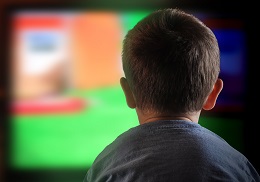07 February 2019
 The simple act of switching on the TV for some downtime could be making a bigger contribution to childhood obesity than we realise, according to new research from the University of South Australia.
The simple act of switching on the TV for some downtime could be making a bigger contribution to childhood obesity than we realise, according to new research from the University of South Australia.
The study investigated the impact of different sitting behaviours – watching television, playing videogames, playing computer, sitting down to eat, or travelling in a car – and found that watching TV is more strongly associated with obesity in both boys and girls than any other type of sitting.
While childhood obesity is a global issue, data from the Australian Bureau of Statistics 2017-18 show that in Australia almost a quarter of children aged 5-17 years are considered overweight or obese.
UniSA researcher, Dr Margarita Tsiros says the study provides new insights about the impact of sedentary behaviours on children.
“It’s no surprise that the more inactive a child is, the greater their risk of being overweight,” Dr Tsiros says.
“But not all sedentary behaviours are created equal when it comes to children’s weight. This research suggests that how long children spend sitting may be less important that what they do when they are sitting.
“For instance, some types of sitting are more strongly associated with body fat in children than others, and time spent watching TV seems to be the worst culprit.”
The study assessed the sedentary behaviours of 234 Australian children aged 10-13 years who either were of a healthy weight (74 boys, 56 girls) or classified as obese (56 boys, 48 girls).
It found that, excluding sleep, children spent more than 50 per cent of their day sitting, with television dominating their time for 2.5 – 3 hours each day.
Dr Tsiros says that the study also found differences between the sitting behaviours of boys and girls.
“Boys not only watched more TV than girls – an extra 37 minutes per day – but also spent significantly more time playing video games,” Dr Tsiros says.
“Video gaming and computer use are popular past times, but our data suggests these activities may be linked with higher body fat in boys.
“Boys who are sitting for longer than 30 minutes may also have higher body fat, so it’s important to monitor their screen and sitting time and ensure they take regular breaks.”
Dr Tsiros says that setting children up on a path towards a healthy weight is extremely important to their health now and in the future.
“When we look at adult obesity, almost two thirds of Australians are overweight or obese, which is causing many serious health issues,” Dr Tsiros says.
“An overweight child is more likely to grow up into an overweight adult, so the importance of tackling unhealthy behaviours in childhood is critical.
“Children who are obese have an increased risk of developing serious health disorders, including type 2 diabetes, high blood pressure and cholesterol.
“They may also experience reduced wellbeing, social and self-esteem issues, along with pain and difficulties with movement and activity.
“By understanding children’s sedentary behaviours – especially those that are placing our kids at risk – we’ll ensure they stay on a better path towards a healthier weight.”
Contact for interview: Dr Margarita Tsiros: +61 8 8302 1320 email margarita.tsiros@unisa.edu.au
Media: Annabel Mansfield: office +61 8 8302 0351 | mobile: +61417 717 504
email: Annabel.Mansfield@unisa.edu.au


